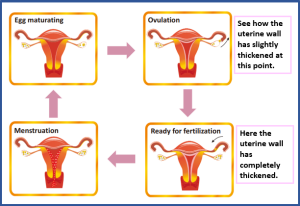Has your favorite T-shirt suddenly started feeling tight? Or maybe your school uniform seems a little snug without you realizing it? These are just a few signs of the many changes your body goes through as you transition from childhood to adolescence.
The age range of 10 to 19 is often referred to as ‘Adolescence’, a transformative phase where secondary sexual characteristics begin to emerge. During this time, your body undergoes significant physical changes, your thoughts and emotions evolve, and even the way you interact with others begins to change.
During adolescence, the reproductive system undergoes various changes driven by hormones or chemicals produced by specific organs in your body called glands. The most important of these is the pituitary gland, a small but powerful structure located at the base of the brain. It plays a key role in signaling other glands to produce hormones.
In males, the testes produce testosterone, the hormone responsible for male sexual characteristics.
In females, the ovaries release oestrogen and progesterone, which are female hormones, essential for female sexual development.
Additionally, the pituitary gland regulates the production of growth hormones, which are crucial for overall development.
Some changes caused by these hormones are specific to boys, while others are unique to girls. For example, one of the key milestones during this phase is the beginning of ovulation in girls and the production of sperm in boys.
This period is not just about physical growth—it is a time of profound transformation as your body and mind prepare for adulthood.
A Time of Change
Some common physical changes in girls
- Height and weight gain
- Breast enlargement
- Skin lightening
- Widening of the hips
- Thigh enlargement
- Hair growth around the armpits and genitals
- Acne on the face
- Vaginal discharge
- Menstruation or the beginning of the menstrual cycle
Some common physical changes in boys
- Increase in height and weight
- Enlargement of the penis, testicles and prostate
- Broadening of the shoulders
- Thighs, muscle enlargement
- Hair growth on the chest, armpits and genitals
- Acne on the face
- Enlargement of the larynx
- Hoarseness of voice
- The appearance of facial hair
- Ejaculation occurs
In addition to physical changes, significant mental and emotional development may take place, which include but are not limited to:
- Frequent mood changes
- Increased sensitivity
- A tendency to think logically
- A tendency to think scientifically
- A drive to try out new things
- A drive to create new ideas
- Interest in body shape, appearance, clothing, and hairstyles
- A display of independence
These physical and mental/emotional changes have an impact on how we behave and interact. This includes but are not limited to:
- Emergence of romantic feelings
- Enjoying peer company
- Forming groups
- Resistance to injustice
- Desire to engage in community service
- Desire to engage with adult society
- Desire to stand out among others
- Willingness to lead
Have you noticed these changes?
The age at which these changes first begin and the time it takes for them to occur can vary from person to person. That’s why it’s important not to compare yourself to others your age. Grow and mature in your own way, at your own pace.
During this period, how we interact with society may change. Understanding why these changes occur is crucial in order for us to manage these changes and ensure we have positive experiences.
1.Increased Sensitivity
As your body goes through numerous changes, physical and emotional, it’s natural to become more sensitive to physical discomforts and your appearance. You might find yourself feeling self-conscious more often than usual. It is a time when even the smallest details can feel like a really big deal.
2. Search for Identity
This is a time when you’re probably asking yourself, “Who am I?” and “What do I stand for?” You start thinking about your place in the world. You’ll likely spend more time with friends than family, and this shift marks the beginning of your journey towards independence from your parents. This is completely natural and is part of the process of finding your own path and identity.
3. Expectations of the Future
During this period, you may begin to focus on your future—career, marriage, children—and what kind of life you want to build. This is also when your family and those close to you may have new expectations of you. With these evolving expectations, you may find yourself facing increasingly more responsibility.
4. Peer Pressure
You, your friends, may feel the urge to follow certain trends — especially those promoted by mainstream and social media. The way we dress, talk, and even behave might change to fit what we think, or believe to be popular. Our likes and dislikes may shift more often than we expect. This could also be your way of fitting in with your peer group.
Peer pressure can influence us in both positive and negative ways. If you’re being pressured to do something you’re not comfortable with, take a moment to consider whether staying in that group is truly in your best interest.
5. Experiencing the Highs and Lows
One moment you might feel excited and joyful, and in the next moment, you may suddenly feel sad and listless. These extreme emotional shifts between are natural during this period, and learning to cope with them is part of the journey.
6. Emerging Sexual Feelings
As you move through adolescence, your body becomes sexually mature. It’s common for many to explore their own bodies with masturbation during this time. Along with that, curiosity about sexual behaviours and attraction to others may begin to emerge. Feeling attracted to someone, whether they’re male or female or Trans, is completely normal.
During the adolescent period, reading a novel or watching a movie may allow for sexual feelings that you’ve not experienced before. This is natural. There is no need to feel guilty. If you have any questions about sex or feelings associated with sex reach out to a trusted adult and get their support.
Understanding how sex organs respond
When sexual arousal occurs, it may trigger a response in our sexual organs. This is more easily noticeable in males than in females. This happens due to increased blood flow to our sexual organs during arousal. For males, the blood flow increases to the penis, causing it to enlarge and become erect. In females, the increased blood flow causes the vaginal walls, clitoris, nipples and labia to swell and become more sensitive to touch. For females, arousal also leads to the release of vaginal fluid, which acts as a natural lubricant during sexual activity and helps reduce friction.
Understanding the Menstrual Cycle
One of the key changes that girls experience during this time is the beginning of her menstrual cycle. When a girl has her first period, it is often referred to as the beginning of womanhood or puberty in society.
During this time, a female’s reproductive system undergoes significant development. Female reproductive cells, known as eggs, are present in large numbers in the ovaries at birth. As girls enter puberty, these eggs begin to mature. The release of an egg from the ovary, known as ovulation, also begins during this stage.
In the early stages of the menstrual cycle, an increase in estrogen hormone causes the lining of the uterus (endometrium) to thicken. Then, the matured egg is released from the ovary and travels through the fallopian tube. During this period, the hormone progesterone helps the uterine lining further develop, preparing for potential pregnancy by enriching it with blood vessels. If fertilization occurs, this nourishing environment supports the development of the embryo.
When fertilization does not occur, the next stage in the ovulation cycle involves a decrease in the secretion of the hormone’s estrogen and progesterone. As a result, the lining of the uterus begins to shed and separates from the uterus. This tissue, along with blood, is then expelled from the body through the vaginal canal. This process is referred to as menstruation. Since this process operates in a cycle, it is known as the menstrual cycle and may continue until she reaches about 50 years of age.

What is sex?
Sexual intercourse includes external activities such as touching, fondling, and inserting a penis or other object into the vagina or anus. Different sexual acts are called different names, and the most important thing in sexual intercourse is the consent of both parties. Remember, consent cannot be obtained by force.
Having sex with someone is a very serious responsibility. It is important to know about the methods available to prevent pregnancy and sexually transmitted infections before having sex. You should also be aware of ‘consent’. Don’t forget that if it is done without consent, it is sexual assault.
When thinking about sex, you should think not only about what you like, but also about what you don’t like. It helps to think about something in advance that you don’t like.
You don’t need to have sex until you feel sure that you are ready. Teenagers are more likely to experiment with sex. The main thing to remember is that if you don’t want to, you don’t have to.
If you’re having sex as a teenager, think about whether it’s in line with your and your family’s values. And don’t let sex interfere with your academic or athletic pursuits.



